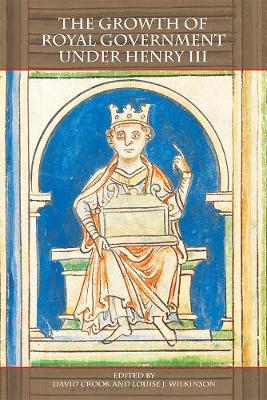Growth of Royal Government under Henry III

Growth of Royal Government under Henry III
The essays here draw on material available for the first time via the completion of the project to calendar all the Fine Rolls of Henry III; these rolls comprise the last series of records of the English Chancery from that period to become readily available in a convenient form, thereby transforming access to several important fields of research, including financial, legal, political and social issues. The volume covers topics including the evidential value of the fine rolls themselves and their wider significance for the English polity, developments in legal and financial administration, the roles of women and the church, and the fascinating details of the development of the office of escheator. Related or parallel developments in Scotland, Wales and Ireland are also dealt with, giving a broader British dimension.
LOUISE J. WILKINSON is Professor of Medieval History, Canterbury Christ Church University; DAVID CROOK is Honorary Research Fellow at the University of Notthingham.
Contributors: Nick Barratt, Paul Brand, David Carpenter, David Crook, Paul Dryburgh, Beth Hartland, Philippa Hoskin, Charles Insley, Adrian Jobson, Tony Moore, Alice Taylor, Nicholas Vincent, Scott Waugh, Louise Wilkinson
PRP: 198.75 Lei
Acesta este Pretul Recomandat de Producator. Pretul de vanzare al produsului este afisat mai jos.
178.88Lei
178.88Lei
198.75 LeiIndisponibil
Descrierea produsului
The essays here draw on material available for the first time via the completion of the project to calendar all the Fine Rolls of Henry III; these rolls comprise the last series of records of the English Chancery from that period to become readily available in a convenient form, thereby transforming access to several important fields of research, including financial, legal, political and social issues. The volume covers topics including the evidential value of the fine rolls themselves and their wider significance for the English polity, developments in legal and financial administration, the roles of women and the church, and the fascinating details of the development of the office of escheator. Related or parallel developments in Scotland, Wales and Ireland are also dealt with, giving a broader British dimension.
LOUISE J. WILKINSON is Professor of Medieval History, Canterbury Christ Church University; DAVID CROOK is Honorary Research Fellow at the University of Notthingham.
Contributors: Nick Barratt, Paul Brand, David Carpenter, David Crook, Paul Dryburgh, Beth Hartland, Philippa Hoskin, Charles Insley, Adrian Jobson, Tony Moore, Alice Taylor, Nicholas Vincent, Scott Waugh, Louise Wilkinson
Detaliile produsului








